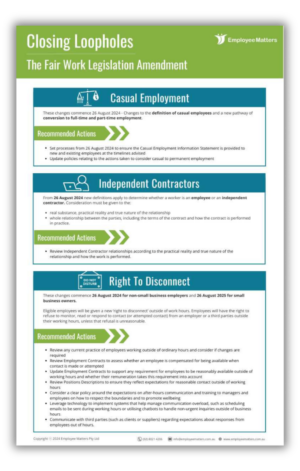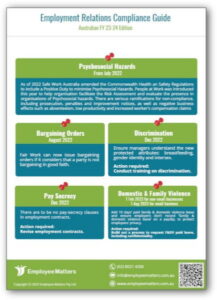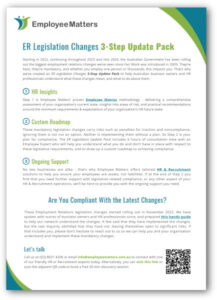By David Brown, General Manager
In our previous blog on the benefits technology has brought to managing disciplinary processes, we discussed not only how things had changed in recent years, but also what had not changed including, as a reminder:
- The right of employees to a fair process including:
- notice of meetings
- the right to bring someone along to support them to a formal meeting
- the right to understand what it is they are alleged to have done or not done
- the right to respond and explain their actions
- The need to make a decision that is fair, just, and not harsh in the circumstances
With all of this in mind, it's easy to focus on the negative connotations such as punitive measures and employee dissatisfaction, or to simply view disciplinary policies & procedures as a way of managing legal risk. We can inadvertently forget the more positive aspects of having clear disciplinary policies & procedures in the workplace.
So, let's explore how clear disciplinary policies & procedures can cultivate a culture of fairness, respect and productivity in your organisation.
The Foundations of a Positive Culture
Whatever the culture of your organisation now, whatever the culture you are aiming towards, it is easy to focus on the activities that enhance the work culture, sometimes at the expense of those elements that sustain a great work environment. Disciplinary policies & procedures can easily fall into the category of ‘negative’ things we don’t like to talk about. But let’s not underestimate the positive impact these essential frameworks have on your organisation.
At the heart of any positive work environment lies a sense of fairness, consistency, and respect. Clear disciplinary policies & procedures lay a solid foundation for achieving these essential elements:
- Fairness: When employees understand the expectations and consequences associated with their actions, they feel a sense of fairness. This eliminates any perception of favouritism or arbitrary decision-making.
- Consistency: Consistent application of disciplinary measures fosters trust and predictability. Employees know what to expect, reducing anxiety and promoting a sense of security.
- Respect: Respect is a cornerstone of any positive workplace. By treating all employees with dignity and providing a fair process for addressing misconduct, you demonstrate respect for their rights and contributions.
Key Benefits of Clear Disciplinary Policies & Procedures
Let’s now explore some of the positive effects that clear disciplinary policies & procedures can have on the culture of an organisation; they can include:
- Enhanced Employee Morale: When employees know that there are clear guidelines in place for addressing misconduct, they feel more confident and secure in their roles. This sense of security can lead to increased job satisfaction and improved morale.
- Reduced Conflict and Misunderstandings: Clear disciplinary policies leave little room for ambiguity. Employees understand the consequences of their actions, minimising the likelihood of misunderstandings and conflicts arising from perceived unfair treatment.
- Improved Productivity: A positive work environment, fostered by clear disciplinary policies, creates a sense of focus and purpose. Employees are less likely to be distracted by concerns about workplace conflicts or disciplinary issues.
- Attracting and Retaining Top Talent: The impact on your Employee Value Proposition (EVP) cannot be underestimated. A reputation for fairness and transparency can make your business so much more attractive to potential employees. It also contributes to employee retention by creating a workplace where people want to stay. Contact Employee Matters to talk further about the power of a great Employee Value Proposition (EVP).
Essential Elements of Effective Disciplinary Policies & Procedures
To finish off, let us look at some of the essential elements to consider when creating your disciplinary policies & procedures:
- Clarity and Accessibility: Your policies & procedures should be written in clear, concise language that is easily understandable by all employees. Make sure they are readily accessible, whether through an employee handbook or an intranet portal.
- Comprehensive Coverage: Your policies should cover a wide range of potential misconduct, including but not limited to:
- Attendance issues
- Workplace harassment and discrimination
- Safety violations
- Theft or fraud
- Fair and Progressive Discipline: Adopt a progressive disciplinary approach that escalates in severity based on the nature and frequency of the misconduct. This may involve verbal warnings, written warnings, suspension, and ultimately, termination of employment.
- Due Process: Ensure that employees have the opportunity to respond to any allegations of misconduct. Provide them with a fair hearing and the chance to present their side of the story.
- Confidentiality: Maintain confidentiality throughout the disciplinary process to protect the privacy of all parties involved.
- Training and Communication: Regularly train managers and supervisors on your disciplinary policies & procedures. Encourage open communication with employees about expectations and consequences.
- Review and Update: Periodically review and update your policies to ensure they remain relevant and compliant with any changes in employment law or workplace practices.
Compliance with Australian Employment Law
When developing and implementing disciplinary policies & procedures, it's crucial to ensure compliance with employment law. Some key considerations include:
- Unfair Dismissal:
Ensure that any termination of employment is not considered harsh, unjust, or unreasonable. - General Protections: Avoid adverse action against employees for exercising workplace rights, such as making a complaint or inquiry about their employment.
- Anti-Discrimination: Do not discriminate against employees on the basis of protected attributes, such as age, race, sex, or disability.
- Workplace Health and Safety: Provide a safe working environment and address any safety concerns promptly.
Clear disciplinary policies & procedures are not about punishment. They are about creating a workplace where everyone understands the expectations, feels valued and respected, and can focus on contributing to the success of the business.
By investing in the development and implementation of clear policies, you can foster a positive work environment that benefits both employees and employers. It's a win-win situation that promotes fairness, productivity, and overall organisational well-being.
To find out more about how we can help you and your organisation leverage the benefits of a great set of disciplinary policies & procedures, Book a Discovery Session with Employee Matters today.
Alternatively, you can contact us at:
Email: info@employeematters.com.au
Phone: (02) 8021 4206
Your Guide
Access this concise Closing Loopholes Bill summary and guide detailing the proposed changes to the Fair Work Act, and the implications for employers.

Book a meeting with Employee Matters today to find the right kind of outsourced HR & Recruitment service for your organisation’s needs:
Employee Relations Legislation Changes Hub
There is a significant amount of mandatory Employment Relations legislative change that impacts you and every other business in Australia now. Our resource hub is designed to help you understand these wide-ranging changes.

3-STEP UPDATE PACK
Take the first step to be compliant. Our 3-Step Update Pack helps Australian business owners and HR professionals understand what these new ER legislation changes mean and what to do about them.
Step 1 - HR Insights
Step 2 - Custom Roadmap
Step 3 - Ongoing Support

Need HR/Recruitment Support?
Call (02) 8021 4206 or email info@employeematters.com.au to discuss your HR, Recruitment or ER Legislation challenges with an experienced member of the Employee Matters team.
Alternatively, you can book a free call by completing the adjacent form:
